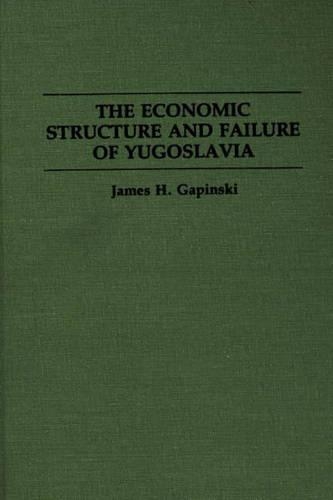
The Economic Structure and Failure of Yugoslavia
(Hardback)
Publishing Details
The Economic Structure and Failure of Yugoslavia
By (Author) James H. Gapinski
Bloomsbury Publishing PLC
Praeger Publishers Inc
30th August 1993
United States
Classifications
Tertiary Education
Non Fiction
Political economy
330.9497
Physical Properties
Hardback
232
Description
For roughly three decades following World War II, Yugoslavia enjoyed economic success unparalleled in the communist world. Then came the 1980s. Economic success turned into economic failure, and before long Yugoslavia ceased to exist. This study addresses the question: Could the failure have been prevented The work begins with a sketch of the historic and economic facts in the life of the country, turning then to theory and the relationship between economic theory and practice in Yugoslavia. It analyzes structure--that which prevailed at the time remedial action could have been taken--and simulates remedial scenarios. Finally, Gapinski draws conclusions from a comprehensive program of restructuring, from the regional composition of the country, and from the profound changes that have swept across Eastern Europe.
Reviews
The insights it provides into the mechanism of the Yugoslav macroeconomy are quite fascinating. They should provide inspiration for economic analysis dealing with the successor states to Yugoslavia. And this book can give welcome analytical underpinning to economic historians looking back at the economic failure of former Yugoslavia.-Slvaic Review
"The insights it provides into the mechanism of the Yugoslav macroeconomy are quite fascinating. They should provide inspiration for economic analysis dealing with the successor states to Yugoslavia. And this book can give welcome analytical underpinning to economic historians looking back at the economic failure of former Yugoslavia."-Slvaic Review
Author Bio
JAMES H. GAPINSKI is Professor of Economics at Florida State University. He has authored and edited several books including Modeling the Economic Performance of Yugoslavia (with B. Skegro and T. Zuehlke) (Praeger, 1989). His published articles number 50, more than a half-dozen of which deal with the Yugoslav economy. Gapinski visited the country on numerous occasions under the sponsorship of professional organizations and helped establish the Yugoslav group Project LINK, a worldwide modeling effort operating under the auspices of the United Nations.
